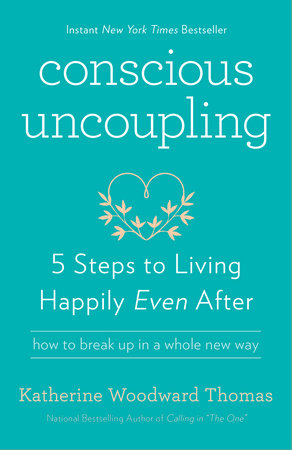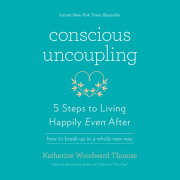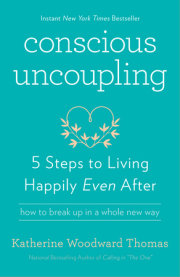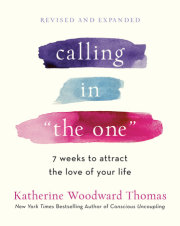Introduction
Landing on the Wrong Side of Love Every intimacy carries, secreted somewhere below its initial lovely surfaces, the ever-coiled makings of complete catastrophe. —Elizabeth Gilbert
None of us think, when walking down the aisle to stand open-hearted before our one true love, that we will one day wind up on the wrong side of that tenacious 50 percent divorce divide. Nor do we assume impending heartache when basking in a newly forming union that is filled with hope and the promise of lifelong happiness. For we are the believers in love, resolute in our fervent stand for forever, and willing to risk it all in our pursuit of happily-
ever-after.
As the author of the national bestseller
Calling in “The One”: 7 Weeks to Attract the Love of Your Life, and teacher to hundreds of thousands of students throughout the world who’ve used my principles to clear away their inner obstacles to love and create happy, loving relationships, I would be lying if I told you I wanted to write this book as the sequel to my last. I did not want to be writing this book any more than you want to be reading it.
In fact, when I realized that my husband of nearly ten years and I were going to end our marriage, my prayer was a little less than pious. Lying flat on my back in the grass at a nearby park, and looking up at the vast blue sky, searching for meaning in this unwelcomed twist of events, I murmured out loud the only prayer that made sense to me at the time. “You’ve
got to be kidding me,” I said, seething. I was beyond irritated at the unseen forces of life and love that seemed hell-bent on entertaining themselves at my expense—forces that seemed determined to create unwanted mischief with my happily-ever-after ending to a rather tumultuous childhood. A happy ending that was documented so beautifully, and
publicly, in my first book.
It was awkward, at best.
Yet, once past the shocking realization that this was indeed happening, I turned my attention to making sure it happened well. For I, like many thousands of my peers, had been the product of a nasty and terribly unconscious uncoupling when I was a young girl. So nasty, in fact, that there were two rather brutal custody fights that led to my eventual alienation from my father, at the age of ten, when he finally threw in the towel and surrendered his parental rights altogether due to his inability to get on at all with my infuriated mother. While I did not know a lot of things as my marriage unraveled before my eyes, the one thing I did know was this: I was not going to do that to our daughter.
Yet, as our separation unfurled, I discovered that I had worried in vain. For not only was ours a very civil uncoupling, it was also deeply kind, respectful, humane, and characterized by an unexpected spirit of generosity and goodwill, with gestures of friendship and mutual support woven throughout. My former husband, Mark, and I did everything in our power to minimize the damage done to one another and, of course, to our young daughter, whose primary concern was that she not lose contact with her father, as she’d seen happen to two of her friends. United in our stand to create cohesion and well-being for our daughter during and after our transition out of the marriage, we readily reassured her she would not.
It was a far cry from the horrible breakups I’d had in the past—those months on end when I’d be unable to eat or sleep, and when I was so consumed with rage that I could barely get through the day without snapping the head off some poor, innocent stranger who was unfortunate enough to get in my way. Or the time when I was so distraught that I started smoking again after nearly a decade, and when half the hair on my head fell out from the stress of it all. Or the mother of all my bad breakups, the heart-wrenching and terribly dramatic, and traumatic, severing I’d had from my high school boyfriend, Frank, which held me captive with an unresolved and prolonged grief that haunted me for years. For nearly two decades he continued to show up in my dreams, frequently shaking me out of a restless sleep to relive the horrible realization that he was indeed gone forever, and was living happily ever after with his intimidatingly beautiful wife and their three perfect children thousands of miles away from me.
I, like you, am well acquainted with the shadow side of love. Which is why, once I had dealt with my own shock and pain, I immediately began to look back to see if I could decipher the process of the rather unique way in which Mark and I had managed to transition out of our union with such goodwill and grace. Because I recognized that we had fallen upon something incredibly valuable, my awareness made more acute by those in our inner circle who would shake their heads in dismay, to declare that they had never seen any couple let go of their marriage with as much thoughtfulness and care.
As much as I had yearned for a happy ending to my less than happy childhood, in an odd twist of fate I seemed to have stumbled upon a new
kind of happy ending. A way to end a romantic union with dignity, goodness, and honor, and where no one was left shattered or destroyed by the experience. And, being the gourmet lemonade maker that I am, I realized that I could even make something beautiful of this. For we’d actually undergone what I eventually was able to identify as a five-step process for leaving each other, and all those impacted by our separation, whole, healthy, and complete rather than wounded, walled off, and significantly broken by the experience.
As a believer in love, and an ardent supporter of marriage and long-term committed relationships, breakups are probably one of my least favorite things. Right up there with global warming, elder abuse, and high child-poverty rates. Given my disdain for breakups and divorce, why then would I choose it as my own life path? How horrible was it between Mark and me that I would venture into the swampland of dividing hearth and home, and the dismantling of long-held hopes and dreams?
There are a million little ways that a marriage grows apart, most too mundane to mention. Yet what happened to Mark and me, in a nutshell, is that I changed. And I mean, I radically and in many ways quite unfairly, changed. It’s kind of an occupational hazard—the downside of being a teacher of growth and transformation. My husband didn’t cheat on me, he didn’t abuse me, and he was not an alcoholic or a chronic gambler.
Yet, as the years went by, the core values by which we lived grew further and further apart. Where I am a change junkie, ever pushing the edge of my own and others’ evolution in pursuit of fulfilling the potential we hold in all areas of life and love, Mark, gentle-hearted man that he is, aspires to the spiritual ideal of total acceptance and appreciation of things as they are, without the need to change anyone or anything. Where I am ever fascinated to dig into the darker recesses of our psyches to discover and purify our inner motives, he believes in minimizing the focus on flaws to simply value the goodness and beauty of all living beings. It’s not like someone is right and someone is wrong here. They are both perfectly gorgeous paths to be on. And often when couples are polarized like this, they find a way to balance each other out, complementing one another and filling in the blank spots for each other in the most lovely of ways. Yet, with Mark and me, conversations about those things that mattered most and that we each held sacred in our hearts just kind of fell flat, in a way that left us little room to grow together toward a shared vision or goal, something we both admitted to needing deeply in our lives. As much as we cared for one another, it became apparent that the place where we were most aligned was in the love we shared for our daughter.
Now, if we had been born fifty years earlier, we would have easily stayed together for the sake of our child, without thinking much about it. Although yet again, if we’d been born fifty years before, we probably wouldn’t have ever gotten married in the first place, as interracial marriages were illegal throughout much of America, until the Supreme Court declared otherwise in 1967. As I am Caucasian and Mark African American, we would have had to risk everything, our very lives included, to choose one another back then—further evidence of the everevolving nature of culture. However, this little detail aside, I, like many millions of others in the Western world, have come to expect more of my primary partnership than staying together for the sake of the children. As author and marriage historian Stephanie Coontz points out, relationships have changed more in the past thirty years than in the three thousand years before. And I, like so many of us, aspired to a union that was far beyond the ones my mother, and my grandmother before her, expected to have. It’s not that Mark and I weren’t wholeheartedly and doggedly devoted to raising a well-adjusted, healthy, happy daughter. Of course we were; our lives revolved around this shared commitment. But did that really mean that we had to be bound together with the bonds of matrimony and morally required to have sex with each other for the rest of our lives in order to do so?
I mean, Mark’s a sexy guy but . . .
seriously?
Copyright © 2016 by Katherine Woodward Thomas. All rights reserved. No part of this excerpt may be reproduced or reprinted without permission in writing from the publisher.







